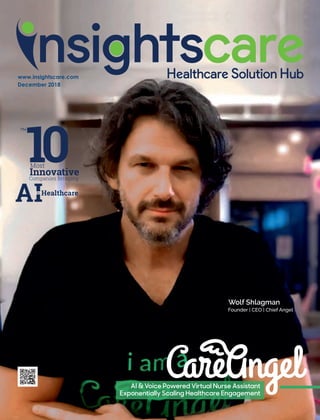“GE HealthCare Discusses AI Advancements and Healthcare Innovations at JPM Conference”

**GE HealthCare Discusses AI Advancements and Healthcare Innovations at JPM Conference**
The annual J.P. Morgan Healthcare Conference (JPM Conference) has long been a platform for industry leaders to unveil groundbreaking advancements, discuss strategic visions, and explore the future of healthcare. At the 2023 conference, GE HealthCare, a global leader in medical technology and digital solutions, took center stage to showcase its latest innovations in artificial intelligence (AI) and healthcare technologies. The company’s presentation highlighted its commitment to transforming patient care, improving operational efficiency, and addressing some of the most pressing challenges in the healthcare industry.
### The Role of AI in Modern Healthcare
Artificial intelligence has emerged as a game-changer in healthcare, enabling faster and more accurate diagnoses, personalized treatment plans, and streamlined workflows. GE HealthCare has been at the forefront of integrating AI into medical imaging, diagnostics, and patient monitoring systems. At the JPM Conference, the company emphasized how its AI-driven solutions are designed to empower clinicians, reduce burnout, and enhance patient outcomes.
One of the key themes of GE HealthCare’s presentation was the concept of “precision care.” By leveraging AI, the company aims to provide clinicians with actionable insights that are tailored to each patient’s unique medical history, genetic profile, and current condition. This approach not only improves the accuracy of diagnoses but also ensures that treatments are more effective and less invasive.
### AI-Powered Medical Imaging
GE HealthCare showcased its advancements in AI-powered medical imaging, a field where the company has consistently been a pioneer. Its imaging systems, such as the Revolution Apex CT scanner and the AIR Recon DL MRI technology, are equipped with AI algorithms that enhance image quality, reduce scan times, and minimize radiation exposure. These innovations are particularly valuable in busy clinical settings, where time and accuracy are critical.
For example, the AIR Recon DL technology uses deep learning to improve the clarity of MRI images, enabling radiologists to detect abnormalities with greater confidence. This not only speeds up the diagnostic process but also reduces the need for repeat scans, which can be costly and inconvenient for patients.
### Operational Efficiency and Workflow Optimization
In addition to improving clinical outcomes, GE HealthCare is leveraging AI to address operational challenges in healthcare facilities. At the JPM Conference, the company highlighted its Command Center software, an AI-powered platform that provides real-time insights into hospital operations. By analyzing data from various sources, the Command Center helps healthcare providers optimize patient flow, reduce wait times, and allocate resources more effectively.
For instance, the platform can predict patient discharge times, identify bottlenecks in emergency departments, and recommend staffing adjustments to meet fluctuating demand. These capabilities are particularly valuable in the context of the ongoing healthcare workforce shortage, which has placed immense pressure on hospitals and clinics worldwide.
### Remote Monitoring and Virtual Care
Another focus area for GE HealthCare is remote patient monitoring and virtual care, both of which have gained significant traction in the wake of the COVID-19 pandemic. The company’s AI-enabled monitoring solutions allow clinicians to track patients’ vital signs and health metrics in real time, whether they are in the hospital or at home. This not only improves patient safety but also enables early intervention in case of complications.
GE HealthCare also discussed its efforts to expand access to virtual care through partnerships and innovative technologies. By integrating AI with telehealth platforms, the company aims to bridge the gap between patients and providers, particularly in underserved and rural areas.
### Addressing Global Health Challenges
During its presentation, GE HealthCare underscored its commitment to addressing global health challenges, such as the rising prevalence of chronic diseases and the need for equitable access to care. The company is investing in scalable solutions that can be deployed in low-resource settings, ensuring that the benefits of AI and healthcare innovation reach a broader population.
For example, GE HealthCare is working on portable ultrasound devices and AI-powered diagnostic tools that can be used in remote or underserved communities. These technologies are designed to provide high-quality care at a lower cost, making them accessible to healthcare providers with limited budgets.
### A Vision for the Future
As GE HealthCare continues to innovate, the company is also focused on fostering collaboration across the healthcare ecosystem. At the JPM Conference, executives emphasized the importance of partnerships with academic institutions, healthcare providers, and technology companies to accelerate the development and adoption of new solutions.
Looking ahead, GE HealthCare envisions a future where AI and digital technologies are seamlessly integrated into every aspect of healthcare, from prevention and diagnosis to treatment and recovery. By harnessing the power of data and analytics, the company aims to create a more connected, efficient, and patient-centric healthcare system.
### Conclusion
GE HealthCare’s presentation at the J.P. Morgan Healthcare Conference highlighted the transformative potential of AI and healthcare innovations. From improving diagnostic accuracy to optimizing hospital operations and expanding access to care, the company is driving meaningful change in the industry. As healthcare continues to evolve, GE HealthCare’s commitment to innovation and collaboration positions it as a key player in